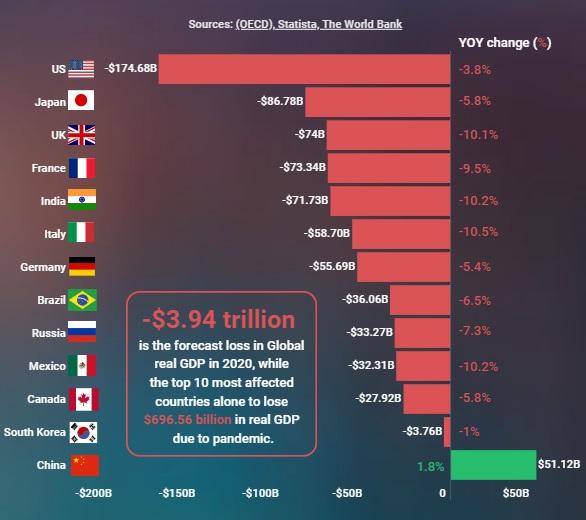According to data from the OECD, Statista and the World Bank, the global economy is set to lose $3.94 trillion in ‘real GDP’ in 2020, due to the COVID pandemic.
We should understand real GDP as a measure of the sum of goods and services produced by a country, with factors such as inflation factored into price changes, which would skew production and consumption data and prevent year-on-year proportional analysis.
According to the data posted by IGOs and presented by BuyShares, the ten most impacted countries will lose a combined $696.56 billion in real GDP during 2020.
The worst-hit is expected to be the US, with the country expected to lose $178.4 billion. They are followed by Japan at $86.78 billion, and then the UK in third place, lumbered with a GDP hit of $74 billion. Close behind is France, at $73.34 billion, while India will be the fifth-most impacted at $71.73 billion.
Other countries to record notable losses in real GDP include Italy,($58.70 billion) Germany ($55.69), Brazil, ($36.06 billion)Russia,($33.27 billion) Mexico, ($32.31 billion)Canada, ($27.92 billion), and South Korea ($3.76 billion).

Based on the data, China is the only country set to post real GDP growth in 2020, with a $51.12 billion jump.
As the rest of the world continues their efforts to contain the virus, the Chinese economy is enjoying a surge in domestic consumption.
Already the world’s leading manufacturer, the country’s COVID containment measures allowed them to resume normal operations sooner, with fewer imports leading to the creation of more domestic employment, and expanded exports of PPE, consumer electronics and other goods in high demand during the pandemic.
The research report also added that the evolution of the COVID pandemic will continue to affect GDP projections:
“The economic projections remain conditional as they largely depend on the evolution of the pandemic and measures put in place to contain the crisis. For example, the development of a vaccine will spur rapid recovery. On the other hand, with some countries like the United States facing a second wave, they might revert to severe containment measures like lockdowns, slowing down the recovery. However, it is largely expected that most governments will be prepared for local sporadic outbreaks giving way for targeted local containment measures as opposed to a national outlook.”




